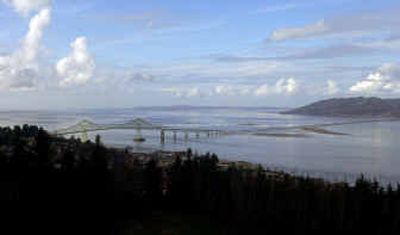Columbia dredging work gets partial funding

PORTLAND – It’s looking less likely that the Columbia River dredging project will be completed by its target year of 2007.
In Washington, D.C., on Thursday, a House panel put $15 million toward the project for 2006 – less than half the total needed to keep it on schedule.
The U.S. Army Corps of Engineers wants to deepen the river channel by 3 feet from Astoria to Vancouver, Wash., to make room for the next generation of international ships and boost capacity at the Port of Portland and other ports in Oregon and Washington.
The corps’ optimal plan called for $15 million in federal money for 2005, $40 million in 2006 and a final $40 million in 2007 – with the remainder of the money paid by state and local authorities.
Despite a campaign pledge from President Bush, the project received just $9 million for this year.
Bush called for $15 million in his 2006 budget, released in February.
On Thursday, the energy and water subcommittee of House Appropriations met Bush’s request but did not exceed it, said Rep. Mike Simpson, R-Idaho, a member of the panel.
Earlier this month, the corps said it would scale back the dredging it planned to complete this year, reducing its goal from 25 miles to 13 miles after construction bids came in 69 percent higher than expected.
The corps has completed some environmental restoration work for the project, and it plans to begin deepening the channel later this summer.
“We will continue to move forward on the project as funding remains available,” said Matt Rabe, a spokesman at the corps’ regional headquarters in Portland.
“It’s up to Congress and the president to decide what are the national priorities. Sometimes it takes longer to construct a project because it is competing with other high-priority items.”
Eric Nieme, an economist with ECONorthwest consulting firm in Eugene, said any delays will increase the cost of the project while potentially reducing savings in shipping.
“The alleged benefits that we would get from that project are now pushed further in the future, which means they are even more speculative than they were at the time the corps put together this plan,” said Nieme, whose firm was hired by Northwest Environmental Advocates to challenge the corps’ assumptions of costs and benefits.